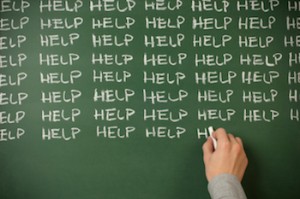This blog was inspired by Jess Ledbetter’s November blog entitled, Pressures of Teaching: Decreasing our Effectiveness? It’s definitely a serious issue that deserves our attention and further study. There are countless reasons why teachers become highly stressed: high stakes exams, demanding administrators, grading papers, lesson planning, and challenging students etc. On a daily basis, those circumstances can challenge teachers to do their jobs well—or overwhelm them. Even the most veteran and “put-together” teacher is dealing with an enormous range of incoming: demands for their time, energy and attention. Teacher stress is nothing new. Everyone knows that teaching is stressful, or do they? At some point, in our career, we have all heard these words: Teachers get to go home at 3 or 4 p.m; they have famously long holidays and their summers off. The truth is, however, you can find tons of research illustrating how this profession is actually the single most stressful job there is!
So why aren’t we seeing more done to help teachers “manage” their stress?
There is no easy answer to this question or quick fix. For one, as teachers, we tend to isolate ourselves and suffer in silence. We do a great job of masking our feelings. We are afraid to tell someone what’s really going on with us because we fear it will negatively impact our job. We don’t want to be seen as weak. This masking or covering up our feelings have led many teachers to quit the profession-or worse-they end up having a mental breakdown. As teachers, it’s our nature to keep giving until we reach complete exhaustion. However, as a profession, we cannot afford to look the other way or take a hands-off approach on this issue. Stressed teachers affect their environment, both personal and professional. Often, they are exhausted from lack of sleep and overwork, which has an impact on their preparation, their class demeanor, and their relationships with their colleagues. More importantly, students especially respond to teacher stress. I have witnessed this with my own eyes. Students sense teacher stress and react to it. Sometimes, the reaction is exactly what the teacher does not need: acting out. How can we expect educators to help students cope with their problems and be ready to learn without first taking time to care for themselves?
This brings me back to Ledbetter’s blog. I believe this inattention to teacher stress weakens our long-term development of teachers significantly. From the very beginning (preservice training), we should be preparing our teachers more skillfully on the types of stress they will encounter in this profession, and how to manage it more effectively. Just as we focus on the whole child, why not take this same approach with beginning teachers. We should give teachers an understanding of how this profession impacts their whole mind and body. I am currently studying mindfulness-based interventions; it’s quite a fascinating study. Mindfulness-based interventions and stress-reducing strategies can lead to improvements not only in teachers’ social and emotional well-being, but also in instructional climate and student engagement. Mindfulness-based interventions are designed to help teachers reduce stress and burnout. We have to start paying more attention to the inner dimensions of the teacher’s life. We must start giving teachers strategies for working with their physical response, their presence and shape in the classroom, so they can access tools and resources to handle the amount of energy that is coming at them. Administrators play a vital role in helping and supporting teachers manage their stress. Administrators must understand his or her role in teacher stress and then change that impact by supporting teachers when they need help. One simple way principals can show this support is to use teacher in-service days to teach or reinforce skills that will have a positive impact on school climate: stress management, conflict management, communication skills and effective techniques for parent-teacher communication.
I want to see more programs in our profession that are designed to help educators tackle stress, nutrition, fatigue, trauma and adversity. In our preservice training, we must start to address the whole teacher. The right methodologies and tools—including those that allow teachers to get in touch with their mind, body, and spirit—can help them do that. Such strategies, not only help teachers holistically, but it can also positively impact a school’s overall climate. I would like to see all of our school districts create specific, proven programs for reducing stress and for helping administrative, teaching, and support staff manage stress and improve communication and problem solving skills. We spend a lot of time providing professional development for teachers to address academic and social issues with their students, but we fail to provide teachers with tools to combat their own stress or offer strategies for teachers to maintain a healthy mind, body and soul.
The journey leading teachers to emotional burnout is multifaceted and influenced by both how teachers deal with stress and how stress shows up in the classroom. It’s an issue that demands and deserves our attention because building mentally healthy teachers can subsequently build emotionally healthy students.
What are you doing to relieve stress in your own life?











Comments 16
Great points and I completely agree. I think that you touch on a great point that it starts with teachers admitting that they are struggling. A few years ago, I adopted the motto “struggle openly.” It was a time when I was really busy with teaching, mentoring, and doctoral work. I found it really freeing to just admit that I was having a hard time. I was cautious not to take a tone of complaint or despair, but I was honest when people asked in saying, “Yeah, I’m having a hard time.” I’ve kept that same motto now that I’m juggling the role of mom and teacher. We just have to be honest with each other in life. Authenticity breeds so much more energy and fearlessness!
This takes me back to conversations that I have had in the hallways of my school every year around this time and again in the Spring. There was so much outside pressure on the job, that you felt like you might be drowning and you did not want to take your students with you. The struggles to be an excellent educator is overwhelming. Support makes all of the difference. When you feel valued and supported its amazing what can change.
I am reading about Restorative Practices and I am so anxious to experiment with them. The difference between this and other behavior management ideas I’ve practiced and read is that you feel heard as a person who may have been hurt. As the teacher in the school, you have the chance to work on yourself, not just your students. You should check it out! “Better than Carrots or Sticks” by Smith, Fisher, and Frey.
Thanks Angie. I definitely would like to take a look at that and continue to study this issue further. If I can do anything to support my colleagues, I’m all in. It’s so frustrating to loose so many of own in this profession because of the stress this type of work brings and feeling like you have no one to talk to or turn to. Thank you for this resource Angie.
Well said, Treva, about an important issue that often goes unnoticed or unaddressed. I agree with you whole-heartedly (and as an eye witness) that students especially respond to teacher stress. And as you say, just as we like to teach the whole child, we need to address the whole teacher.
Treva I love the idea of having programs in place to help with stress, nutrition, fatigue, trauma and adversity. I wonder what that would look like. Would these programs need a funding source or could we illicit the help of the community t donate their time & expertise?
Have you seen/know of any schools/districts that have embarked on a wellness initiative? Thanks for giving me something to think about as well as some research to do!
Author
Just recently, my principal teamed up with Strive to Thrive. It is run by a former teacher, Darrlyn Gooden. He runs a non-profit organization called Keep Teachers Teaching. I never even knew this program existed. It is wonderful Danielle. The Strive to Thrive is a 4 month wellness program for teachers. It’s all free. Teachers are given nutrition advice and a work out plan. It’s also a competition (so prizes will be given out at the end of the program. I believe this wellness program is open to all schools in the district that who want to participant.
For more information about Keep Teachers Teaching , here is his website. I just started
https://www.keepingteachersteaching.org/
Just recently, my principal teamed up with Strive to Thrive. It is run by a former teacher, Darrlyn Gooden. He runs a non-profit organization called Keep Teachers Teaching. I never even knew this program existed. It is wonderful Danielle. The Strive to Thrive is a 4 month wellness program for teachers. It’s all free. Teachers are given nutrition advice and a work out plan. It’s also a competition (so prizes will be given out at the end of the program. I believe this wellness program is open to all schools in the district that who want to participant.
For more information about Keep Teachers Teaching , here is his website. I just started
https://www.keepingteachersteaching.org/
Hi Treva-
You talk about teachers isolating themselves and suffering in silence. Being afraid to tell someone what’s really going on because they fear it will negatively impact their job. I wonder how to create a space where all voices are heard?
I’ll be honest when you said teachers go home at 3:00 or 4:00 and long holidays, etc. it made me laugh a little. How many days have you left school at a reasonable hour and quite frankly had no mental or cognitive capacity left?
This is absolutely an issue that we in education need to address. From teachers, to administrators, to paraprofessionals, classified and district office. We as an education community need to reassess what we do and how to provide that emotional support.
Author
Jen, I find when teachers have a buddy teacher, a person they feel comfortable sharing with (a confidante), that person becomes that safe zone to share their frustrations. I also think the protocols we were given from the Az K-12 Center like the tuning protocol (if done often enough) can create that safe zone where teachers feel comfortable sharing and asking for help. I also believe it starts with the culture of the organization; if we establish a culture where teachers know and feel safe in opening up and sharing when they begin to feel the stress of their work, it will become the norm. Like you said, “From teachers, to administrators, to paraprofessionals, classified and district office. We as an education community need to reassess what we do and how to provide that emotional support.”
Jen, I find when teachers have a buddy teacher, a person they feel comfortable sharing with (a confidante), that person becomes that safe zone to share their frustrations. I also think the protocols we were given from the Az K-12 Center like the tuning protocol (if done often enough) can create that safe zone where teachers feel comfortable sharing and asking for help. I also believe it starts with the culture of the organization; if we establish a culture where teachers know and feel safe in opening up and sharing when they begin to feel the stress of their work, it will become the norm. Like you said, “From teachers, to administrators, to paraprofessionals, classified and district office. We as an education community need to reassess what we do and how to provide that emotional support.”
Treva, I taught for 8 years before the levels of stress caught up with me and I quite teaching. I moved and started a new career. I missed my career and decided to return. Since my return, I have made choices to ensure that I manage my stress. I only stay late in my classroom one day a week. Every other day, I leave by 4, which is 30 minutes past my contract time. On holiday breaks, I refuse to bring my school bag home which forces me to use my holiday to spend time on myself and with my friends or family. I only bring papers home to grade 2 nights a week because it is less stressful to do at home on my couch in my pajamas with a (soda). I also budget out what I am allowed to spend on my classroom. Once I hit that level, I refuse to spend more. I find ways to accomplish what I need without my own personal money. One thing that is hard to do is to shut off my mind. I spend a lot of my own time thinking and worrying about my students. This causes my friends and family to think that I am not entirely in the present. This puts stress on my relationships.
Author
I totally know where you are coming from Donnie. I am the same way. It’s very hard to “shut it off” when we care so much. Like you, I have however, gotten much better at balancing and managing my time so that I give myself time to decompress and shake off the everyday stress.
I totally know where you are coming from Donnie. I am the same way. It’s very hard to “shut it off” when we care so much. Like you, I have however, gotten much better at balancing and managing my time so that I give myself time to decompress and shake off the everyday stress.
I’m so glad you put the onus on teachers to speak up– and complaining doesn’t count. Nice work– I really enjoy reading your posts.
Nice job!
This line nails is: “We don’t want to be seen as weak.” If teachers talked more about their stress, the idea that being stressed out equates to weakness would be reduced. I love the idea of training teachers (and pre-service teachers) to deal with stress. That’s a PD class I would want to attend.
I am stressed beyond belief.. Having 170 kids tugging at you 8 hrs a day is no easy job. I am totally taking this post to my powers that be and ask for more teacher focused PD. I could not agree with you more on this blog.